Economy
Oil Prices Jump, Stocks Fall On Middle East Tensions

Oil prices surged and major stock markets mostly retreated Thursday as investors reacted to fears of widening conflict in the Middle East.
Prices jumped after US President Joe Biden said he was “discussing” possible Israeli strikes on Iranian oil sites in retaliation for Tehran’s missile barrage on Israel.
Brent, the international benchmark, surged more than five percent to $77.62 a barrel, with US contract West Texas Intermediate rising similarly.
Major US stock indices spent most of the day in the red, with the S&P 500 ending down 0.2 percent.
London, Paris and Frankfurt all closed in the red.
A strike by US dockworkers and speculation about the US Federal Reserve’s next interest rate moves also had an influence on investors, with a key employment report coming Friday.
The dollar gained, helped by its haven status, with the British pound sinking more than one percent against the greenback as Bank of England chief Andrew Bailey hinted at faster cuts to UK borrowing costs.
In Asia, Tokyo closed two percent higher as the yen eased, providing oxygen to the country’s exporters.
Hong Kong fell for the first time in more than a week, after a blistering surge fueled by China’s bold steps to stimulate its weak economy.
Iran’s missile attack on Israel this week has raised fears that Israel’s conflict with Tehran-backed groups in Gaza and Lebanon may grow into a wider regional war.
“Markets are in a state of suspense, bracing for Israel’s anticipated retaliation against Iran — a move that could catapult oil prices skyward,” said independent markets analyst Stephen Innes.
Iran, which backs Lebanese militant group Hezbollah, said it would step up its response if Israel counterattacked.
More than 1,000 people have so far been killed in the Israeli bombardment of Lebanon, which has included strikes on Beirut.
Israel’s military said Thursday it had hit Hezbollah’s intelligence headquarters in the Lebanese capital, as troops battled militants near the border and warplanes dropped bombs around the country.
Analysts, however, said oil price gains could be limited as US stockpiles rose more than expected last week while Libya’s eastern administration announced Thursday it had ended a month-long production and export blockade.
The Saudi-led OPEC+ oil cartel is due to raise production from December, further easing concerns about supply.
Investors will turn their attention to key US non-farm payroll jobs report on Friday, which could provide clues about the Fed’s plans for interest rates after last month’s first cut in four years.
Data on Wednesday showed a surprise uptick in US private sector hiring in September.
“Friday’s official payroll report will be critical, especially as markets weigh geopolitical risks against the domestic economy’s performance,” said Fawad Razaqzada, market analyst at City Index and Forex.com.
Key figures around 2030 GMT
Brent North Sea Crude: UP 5.0 percent at $77.62 per barrel
West Texas Intermediate: UP 5.2 percent at $73.71 per barrel
New York – Dow: DOWN 0.4 percent at 42,011.59 (close)
New York – S&P 500: DOWN 0.2 percent at 5,699.94 (close)
New York – Nasdaq: DOWN less than 0.1 percent at 17,918.48 (close)
London – FTSE 100: DOWN 0.1 percent at 8,282.52 (close)
Paris – CAC 40: DOWN 1.3 percent at 7,477.78 (close)
Frankfurt – DAX: DOWN 0.8 percent at 19,015.41 (close)
Tokyo – Nikkei 225: UP 2.0 percent at 38,552.06 (close)
Hong Kong – Hang Seng Index: DOWN 1.5 percent at 22,113.51 (close)
Shanghai – Composite: Closed for a holiday
Pound/dollar: DOWN at $1.3124 from $1.3266 on Wednesday
Euro/dollar: DOWN at $1.1029 from $1.1048
Euro/pound: UP at 84.03 pence from 83.26 pence
Dollar/yen: UP at 146.92 from 146.38 yen
AFP
Economy
Inflation surged to 24.23% due to escalating cost of living
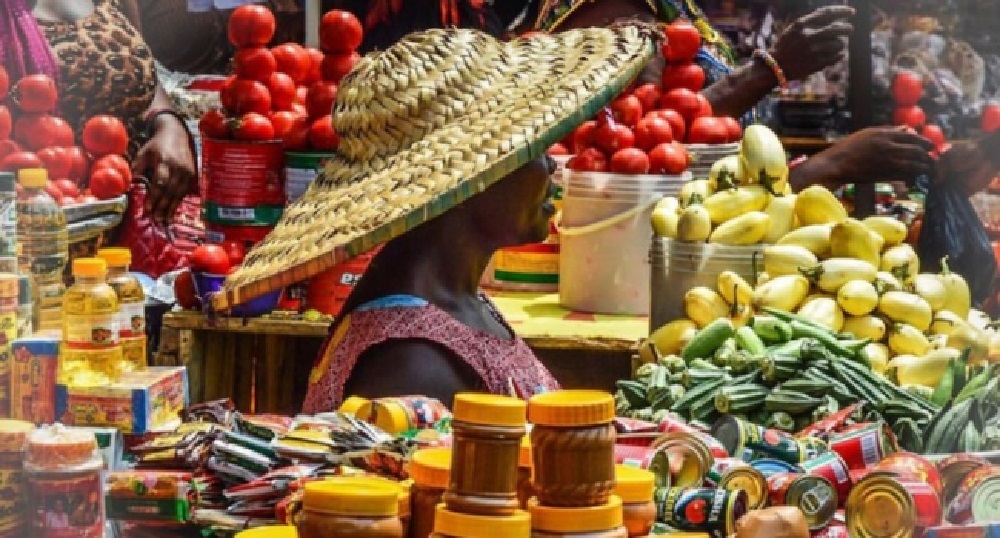
Inflationary pressure has reappeared as Nigerians grapple with increases in average costs of basic food items and energy.
For the first time after the rebasing of the Consumer Price Index (CPI), headline inflation spiked in March to 24.23 per cent – 105 basis points above the 23.18 per cent recorded in the previous month.
The National Bureau of Statistics (NBS) yesterday indicated that the rate of increase in the average price level was higher in March than the level in February.
In January, the NBS updated the weight and price reference periods in calculation of the CPI to make the inflationary gauge more reflective of changes in consumption patterns and the economy generally.
The rebasing did not only brought the base year closer to the current period from 2009 to 2024, it also introduced some critical methodology changes to improve the computation processes.
After the rebasing, inflation dropped from 34.80 per cent in the pre-rebased period of December 2024 to 24.48 per cent in January 2025. It dropped further to 23.18 per cent in February.
In its latest report, NBS recorded 186 basis points changes between the monthly inflation rate, with the month-on-month rate rising from 2.04 per cent in February to 3.90 per cent in March.
The NBS attributed the spike to the rise in costs of food and alcoholic beverages, fuels and electricity, among other items.
Analysts at CardinalStone said the resurgence was due to renewed foreign exchange (forex) pressures amid heightened global risk-off sentiment.
They pointed at foreign portfolio investments (FPIs) outflows and increased dollar demand, which saw naira dropping by 2.4 per cent in March.
Experts also cited increase in price of Premium Motor Spirit (PMS) or petrol, following the temporary suspension of the naira-for-crude swap arrangement.
Food inflation rate stood at 21.79 per cent in March 2025. The composite food index decreased to 21.79 per cent from 23.51 per cent.
Core inflation, which excludes volatile agricultural produce prices and energy, rose to 24.43 per cent from 23.01 per cent.
Specifically, the month-on-month food inflation rose by 50 basis points from 1.67 per cent in February to 2.18 per cent in March.
The NBS attributed the increase in food inflation to increases in the average prices of basic food items including ginger, garri, broken rice, honey, crabs, potatoes, plantain flour, periwinkle and pepper amongst others.
On a state-by-state basis, food inflation was higher in Oyo with 34.41 per cent; Kaduna (31.14 per cent) and Kebbi (30.85 per cent).
On the other side, the 9.61 per cent recorded by Bayelsa; Adamawa (12.41 per cent) and Akwa Ibom (12.60 per cent), were the lowest inflation rates.
Analysts expressed concerns that the resurgent inflationary pressure might lead to renewed tightening stance by the Central Bank of Nigeria (CBN).
CBN Governor Dr. Olayemi Cardoso, had at the end of the first Monetary Policy Committee (MPC) meeting in 2025, reiterated the apex bank’s commitment to orthodox monetary policies, noting that the apex bank’s stance will be reflective of the inflationary trend.
With inflation rate dropping in February, the MPC had decided to maintain all key monetary policy parameters, including the Monetary Policy Rate (MPR) at 27.50 per cent, the asymmetric corridor around the MPR at +500/-100 basis points, the Cash Reserve Ratio (CRR) at 50.00 per cent for Deposit Money Banks and 16.00 per cent for Merchant Banks, and the Liquidity Ratio at 30.00 per cent.
Clarifying the impact of the rebased CPI, Cardoso had explained that the lower inflation figure should not be misinterpreted.
He underlined the need to analyse more data before drawing comparisons, noting that the CBN is currently assessing the figures and will provide further guidance in due course.
The CBN boss stressed the critical importance of collaboration between monetary and fiscal authorities in sustaining recent economic improvements.
Addressing concerns about the impact of elevated borrowing costs on economic growth, the CBN governor assured that the apex bank’s primary objective is to stabilize the foreign exchange and financial markets.
He expressed confidence that such stability would attract increased foreign investments, stimulating the much-needed economic growth.
Cardoso also highlighted the competitiveness of the Nigerian currency, which has spurred growing interest from international investors.
Economy
SEE Current Black Market Dollar (USD) To Naira (NGN) Exchange Rate

The exchange rate between the US dollar and the Nigerian naira continues to draw significant attention from individuals and businesses alike, especially those involved in international trade and remittances.
On Saturday, April 12, 2025, activity in the Lagos parallel market, commonly known as the black market shows that the buying rate for one US dollar stands at ₦1570, while the selling rate is ₦1575.
These figures are sourced from traders and Bureau De Change (BDC) operators who are active in key currency exchange hubs across Lagos.
Why the Black Market Rate Matters
Although the Central Bank of Nigeria (CBN) does not officially recognize or support the use of the black market for foreign exchange transactions, many Nigerians still rely on it due to difficulties in accessing forex through official banking channels. Issues such as limited availability, long processing times, and strict documentation requirements have made the black market a more accessible, albeit riskier, alternative.
CBN’s Official Position
The CBN continues to warn against participating in parallel market trading, stating that such activities undermine the stability of the national currency. The apex bank urges those in need of foreign currency to apply through authorized financial institutions, which are mandated to follow official exchange rates.
Nonetheless, the disparity between the official and unofficial markets persists, often influenced by market forces such as demand, inflation, and fluctuations in Nigeria’s foreign reserves.
Latest Exchange Rates Overview
Black Market (Parallel Market) Rate
Currency Pair Buying Rate Selling Rate
USD/NGN ₦1570 ₦1575
CBN Official Rate
Currency Pair Highest Rate Lowest Rate
USD/NGN ₦1630 ₦1570
Key Notes for Forex Users
The exchange rates in the black market often differ slightly from one location or dealer to another due to market volatility and negotiation margins.
Rates can also fluctuate within hours based on economic news, government policies, and global financial trends.
It is advisable to compare rates from multiple sources before conducting any large transactions, especially in volatile markets.
What This Means for Nigerians
The current forex rates reflect continued pressure on the naira, and many analysts believe that inflation, reduced oil revenue, and inconsistent monetary policies are key factors driving the demand for the dollar. For everyday Nigerians, this means the cost of imported goods remains high, and businesses dependent on international suppliers face growing challenges.
Until forex supply stabilizes through official channels, the black market will likely remain a major player in Nigeria’s currency landscape.
Economy
CHECK Exchange Rate As Naira Weakens More In Parallel Market

Naira has continued its downward slide in the parallel market on Thursday, exchanging at N1,621/$1, a depreciation from N1,580/$1 recorded just a day earlier on Wednesday.
This represents a N41 decline in 24 hours, deepening concerns among traders and economic watchers about sustained volatility in the FX market.
While the official exchange rate stood at N1,644.00/$1 on Wednesday, according to figures published on the Central Bank of Nigeria (CBN) website, there was no updated official rate published by the CBN several hours after the market close on Thursday.
Meanwhile, market participants at Wuse Zone 4 in Abuja attributed the persistent depreciation to a resurgence in speculative activities, unmet demand from importers, and lingering confidence issues in the foreign exchange market.
Alhaji Aminu Gwadabe, President of the Association of Bureau De Change Operators of Nigeria (ABCON), attributed the ongoing volatility in the forex market to a mix of local and global uncertainties. In a message sent to Nairametrics, he stated:
“The volatility, fears, happenings, and shocks in both the local and international markets called for disdain.
President Trump’s tariff announcements have sent markets into panic, loss of confidence, revenue losses, and budget reviews.”
He added that despite ongoing interventions by the CBN, instability persists.
“As usual, the CBN, being a catalytic actor, must continue to ensure stability through timely interventions. However, volatility remains a challenge and needs to be more comprehensively addressed,” Gwadabe said.
He further called for an expanded policy transmission mechanism to better serve the retail end of the FX market.
“It is therefore necessary for the CBN to reevaluate the efficacy of that Policy transmission mechanisms and expand its scope to the BDCs retail segment of the market to cater for the needs of the critical retail needs of invisible transactions where the BDCs pose the most potent tool of the CBN policy transmission mechanism.”
Dr. Muda Yusuf, CEO of the Centre for the Promotion of Private Enterprise (CPPE), also linked the naira’s recent struggles to global developments and speculative pressures.
“This is not unconnected to recent policy signals from President Trump and global oil price movements. The market is heavily information-driven, and speculative pressure has spiked following the tariff announcements,” Yusuf explained.
“Now that Trump appears to be having second thoughts, we might even see a bit of a breather in the FX market,” he added.
Meanwhile, traders on the ground say the situation is being worsened by the uncertainty surrounding ongoing government reforms and inconsistent access to official FX windows.
“The demand today was unusually high, especially from small businesses that can’t access the banks. It’s putting pressure on our supply,” a trader at Abuja’s Wuse Zone 4, who asked not to be named stated.
The spread between the official exchange rate of N1,644/$1 and the parallel market rate of N1,621/$1 narrowed slightly on Thursday, a sign that some convergence may be taking place, despite persistent volatility.
Market analysts warn that unless the CBN resumes consistent interventions or significantly boosts FX liquidity, the naira may continue to face downward pressure in the weeks ahead
The continued slide of the naira, despite heightened CBN interventions, signals persistent challenges in Nigeria’s FX liquidity and structural demand-supply mismatch.
-
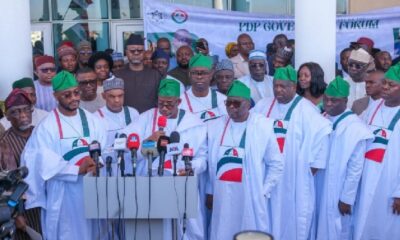
 News21 hours ago
News21 hours agoPDP governors declare support for Tinubu
-

 News22 hours ago
News22 hours agoHope for Nigerians as Dangote refinery slashes petrol price again
-

 News22 hours ago
News22 hours agoRivers Emergency Rule: Abbas inaugurates 21-member panel
-
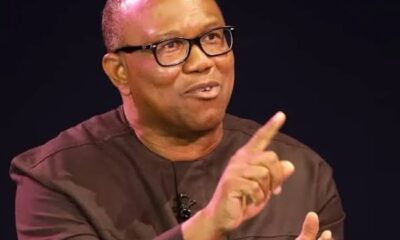
 News23 hours ago
News23 hours agoPeter Obi asks president Tinubu to suspend France trip
-

 News21 hours ago
News21 hours agoN1.3trn CBEX Scam: EFCC caution Nigerians against Ponzi Schemes
-

 News8 hours ago
News8 hours agoFG expresses sympathy for CBEX victims, urges a united effort to combat Ponzi schemes
-
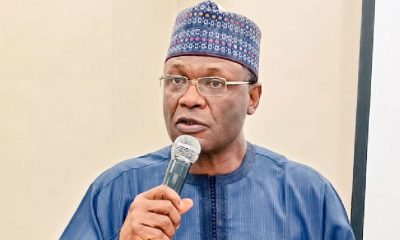
 News23 hours ago
News23 hours agoINEC chair, Yakubu calls on African youths to promote peaceful elections
-
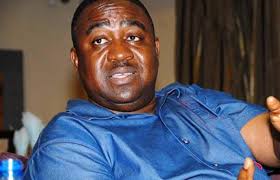
 News21 hours ago
News21 hours agoSuswan kicks as PDP governors reject merger talks





